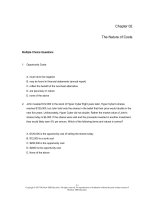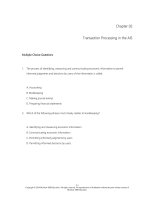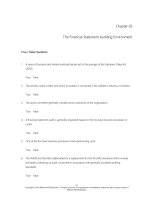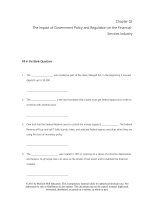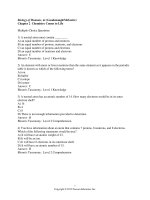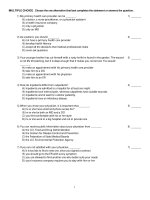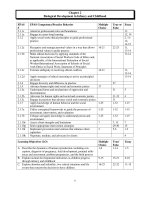Economics and contemporary issues 9th edition mclean test bank
Bạn đang xem bản rút gọn của tài liệu. Xem và tải ngay bản đầy đủ của tài liệu tại đây (160.28 KB, 15 trang )
Chapter 2—An Introduction to Economic Systems and the Workings of the Price
System
TRUE/FALSE
1. In order for the price system to work well, it must be based upon voluntary exchange between
informed people.
ANS: T
PTS: 1
2. Relative price measures what must be given up in order to purchase an item.
ANS: T
PTS: 1
3. The division of labor increases output because workers experience a feeling of accomplishment when
performing the same task a number of times.
ANS: F
PTS: 1
4. One of the economic outcomes determined by the choices people make in an economic system is the
quantities of various goods and services to be produced.
ANS: T
PTS: 1
5. Division of labor implies specialization of economic activity.
ANS: T
PTS: 1
6. Voluntary exchange occurs if at least one party expects to benefit.
ANS: F
PTS: 1
7. The demand curve shows the quantity demanded of a good for each possible price, holding other
factors that affect demand constant.
ANS: T
PTS: 1
8. The law of demand states that the quantity demanded of a good is negatively related to the good's
price.
ANS: T
PTS: 1
9. As the price of a good increases, the quantity of the good supplied will decrease.
ANS: F
PTS: 1
10. If there is an excess demand for N'Sync CDs, the price of N'Sync CDs would rise.
ANS: T
PTS: 1
11. The market price of Sheryl Crow concert tickets is $40 per ticket. Excess supply would exist if the
market price was $30 per ticket.
15
ANS: F
PTS: 1
12. The market for housing is in equilibrium when the quantity of housing demanded is equal to the
quantity of housing supplied.
ANS: T
PTS: 1
13. Producers are assumed to maximize output.
ANS: F
PTS: 1
14. In a market economy, prices inform, motivate, and ration.
ANS: T
PTS: 1
15. An increase in the supply of rollerblades will result in a higher equilibrium price for rollerblades.
ANS: F
PTS: 1
16. Prices in a command economy do not change very often, and thus do not inform consumers about the
relative scarcity of goods.
ANS: T
PTS: 1
17. Demand and supply framework explains how prices are formed in a competitive markets.
ANS: T
PTS: 1
18. Market economic systems must have a legal and institutional framework that supports private property
and the validity of contract.
ANS: T
PTS: 1
19. Demand and supply framework explains how prices are formed in a command economy.
ANS: F
PTS: 1
20. In a competitive market demanders and suppliers are price takers.
ANS: T
PTS: 1
MULTIPLE CHOICE
1. The relative price of a good is:
a. the price of one good in terms of another.
b. the money price of a good.
c. identical to the absolute price of the good.
d. not a very good measure of how much must be given up in order to purchase an item.
ANS: A
PTS: 1
2. Suppose the price of an automobile is $20,000. The opportunity cost of the automobile is:
16
a.
b.
c.
d.
$20,000.
the best alternative use of the $20,000.
all alternative uses of the $20,000.
measured by the purchasing power of the $20,000.
ANS: B
PTS: 1
3. Suppose all prices double. As a result:
a. there will be no change in the opportunity cost of goods.
b. the opportunity cost of goods will increase.
c. the opportunity cost of goods will decrease.
d. the opportunity cost of some goods will increase while the opportunity cost of other goods
will decrease.
ANS: A
PTS: 1
4. In a market system:
a. people do not have to generally agree and obey laws.
b. no informal rules of conduct are required.
c. private property rights are defined, established, and protected by law.
d. very few ownership structures must be created.
ANS: C
PTS: 1
5. An economic system determines:
a. how a government will be established
b. the culture of a society.
c. the methods that will be used to determine property rights.
d. the methods that will be used to produce goods and services.
ANS: D
PTS: 1
6. Division of labor increases the production of goods and services because:
a. it allows people to become highly skilled in particular tasks.
b. it reduces the time wasted as people shift from one task to another.
c. it increases inventions and innovations.
d. all of the above.
ANS: D
PTS: 1
7. Voluntary exchange will occur when:
a. only one individual involved in the exchange benefits.
b. all individuals involved in the exchange benefit.
c. only one individual involved in the exchange has access to all pertinent information.
d. there are no alternatives to the exchange.
ANS: B
PTS: 1
8. A schedule showing the amount of a good people are willing and able to purchase at various prices is:
a. a production possibilities schedule.
b. a demand schedule.
c. a supply schedule.
d. an efficiency production schedule.
ANS: B
PTS: 1
17
9. The demand price is:
a. the price at which quantity demanded is equal to quantity supplied.
b. the price at which producers receive just enough money to cover their production costs.
c. the price just high enough so that a specified quantity will be purchased.
d. the price at which consumers will buy a greater quantity than the market is offering.
ANS: C
PTS: 1
10. The law of demand states that, other things constant, there is:
a. a positive relationship between income and quantity demanded.
b. a negative relationship between income and quantity demanded.
c. a positive relationship between price and quantity demanded.
d. a negative relationship between price and quantity demanded.
ANS: D
PTS: 1
11. Suppose that the price of Pepsi decreases from $4.50 to $4.20 per twelve-pack. The law of demand
states that if other things are held constant:
a. quantity demanded will increase.
b. quantity demanded will decrease.
c. quantity supplied will increase.
d. quantity supplied will decrease.
ANS: A
PTS: 1
12. The law of demand exists because, in general:
a. people find that each additional unit of a good consumed has less value.
b. people find that each additional unit of a good consumed has more value.
c. people are willing to pay more for additional units of a good.
d. the demand price of a good rises as additional units are consumed.
ANS: A
PTS: 1
13. A schedule showing the quantity of computers that producers are willing to supply at different prices
is:
a. a demand schedule.
b. a production possibilities schedule.
c. a supply schedule.
d. a consumption schedule.
ANS: C
PTS: 1
14. The law of supply states that, other things constant, there is:
a. a positive relationship between price and quantity demanded.
b. a negative relationship between price and quantity demanded.
c. a positive relationship between price and quantity supplied.
d. a negative relationship between price and quantity supplied.
ANS: C
PTS: 1
15. Suppose the price of CDs increases from $12 to $15 per CD. The law of supply states that if other
things are constant:
a. quantity supplied will increase.
b. quantity supplied will decrease.
c. quantity demanded will increase.
d. quantity demanded will decrease.
18
ANS: A
PTS: 1
16. The law of supply exists because:
a. as additional units of a good are produced, opportunity cost increases.
b. as additional units of a good are produced, opportunity cost decreases.
c. the value consumers place on additional units decreases as more is consumed.
d. the value consumers place on additional units increases as more is consumed.
ANS: A
PTS: 1
17. According to economic theory:
a. producers attempt to maximize output.
b. consumers attempt to maximize profits.
c. consumers and producers in a competitive economy are price seekers.
d. consumers and producers in a competitive economy are price takers.
ANS: D
PTS: 1
18. In a market economy, prices:
a. inform.
b. motivate.
c. ration.
d. all of the above.
ANS: D
PTS: 1
19. Excess demand will exist when:
a. market price exceeds the equilibrium price.
b. market price is less than the equilibrium price.
c. market price is equal to the equilibrium price.
d. quantity supplied exceeds quantity demanded.
ANS: B
PTS: 1
20. Excess supply will exist when:
a. market price is greater than the equilibrium price.
b. market price is less than the equilibrium price.
c. market price is equal to the equilibrium price.
d. quantity demanded is greater than quantity supplied.
ANS: A
PTS: 1
21. In a market economy, consumers are assumed to:
a. pursue profits.
b. pursue their self-interest.
c. pursue revenues.
d. pursue what is best for society.
ANS: B
PTS: 1
22. Which of the following statements is correct?
a. Because it is expensive to change prices in a command economy, they do not change very
often.
b. Prices in a command economy generally provide consumers with appropriate information
concerning scarcity and opportunity cost.
19
c. The price system in a command economy is anonymous.
d. Only the prices of basics such as food are allowed to change on a regular basis in a
command economy.
ANS: A
PTS: 1
23. If the price of a can of Pepsi increase from $0.50 to $0.75, and the price of a can of Coke also
increases from $0.50 to $0.75:
a. the price of Pepsi relative to Coke has not changed.
b. the price of Pepsi relative to Coke has increased.
c. the price of Pepsi relative to Coke is unknown.
d. None of the above statements are true.
ANS: A
PTS: 1
24. Which situation is indicative of barter?
a. A physician chooses to grow her own food and trade it for carpentry work.
b. The government accepts fuel, fertilizer, and pesticides in lieu of tax payments by
companies.
c. A power company accepts medicine from a pharmaceutical company as payment for
electricity.
d. All of the above are indicative of barter.
ANS: D
PTS: 1
Case
Use the following diagram to answer the following questions.
25. Refer to Case. If the price of soft drinks is $6 per case, the quantity demanded per month is:
a. 1 case.
b. 2 cases.
c. 3 cases.
d. 4 cases.
20
ANS: B
PTS: 1
26. Refer to Case. The demand price of 4 cases of soft drinks is:
a. $2.
b. $4.
c. $6.
d. $8.
ANS: A
PTS: 1
27. If the price increases from $2 per case to $6 per case, the quantity demanded:
a. will decrease by 2 cases per month.
b. will decrease by 4 cases per month.
c. will increase by 2 cases per month.
d. will increase by 4 cases per month.
ANS: A
PTS: 1
28 Suppose Jeff is willing to pay a maximum of $20 for a Smashing Pumpkins CD. This $20 represents:
a. Jeff's supply price of the CD.
b. the producer price of the CD.
c. Jeff's demand price for the CD.
d. the consumer price for the CD.
ANS: C
PTS: 1
Pen
Use the following diagram to answer the following questions.
29. Refer to Pen. If the price of pens is $4 per pen, the quantity supplied will be:
a. 10.
b. 20.
c. 30.
d. 40.
ANS: D
PTS: 1
30. Refer to Pen. The supply price of 10 pens is:
a. $1.
b. $2.
21
c. $3.
d. $4.
ANS: A
PTS: 1
31. Refer to Pen. If the supply price increases from $1 to $3 per pen, the quantity supplied:
a. will decrease by 10 pens per day.
b. will decrease by 20 pens per day.
c. will increase by 20 pens per day.
d. will increase by 10 pens per day.
ANS: C
PTS: 1
32. Suppose producers must be paid $1,000 per computer for them to be just willing to provide the market
with 2,500 computers per month. The $1,000 represents:
a. the consumer price for 2,500 computers.
b. the demand price for 2,500 computers.
c. the producer price of 2,500 computers.
d. the supply price of 2,500 computers.
ANS: D
PTS: 1
33. In a market economy, as producers compete for profits by increasing production:
a. prices will fall.
b. prices will rise.
c. prices will not be affected by this action.
d. prices will at first fall and then increase.
ANS: A
PTS: 1
Unit
Use the following diagram to answer the following questions.
34. Refer to Unit. The equilibrium price and quantity of housing is:
a. $80,000 and 10,000, respectively.
b. $85,000 and 20,000, respectively.
22
c. $90,000 and 10,000, respectively.
d. $90,000 and 30,000, respectively.
ANS: B
PTS: 1
35. Refer to Unit. If the price of housing is currently $90,000 per unit, there will be:
a. an excess demand of 20,000 units.
b. an excess demand of 10,000 units.
c. an excess supply of 20,000 units.
d. an excess supply of 30,000 units.
ANS: C
PTS: 1
36. Refer to Unit. If the price of housing is currently $80,000 per unit there will be:
a. an excess demand of 20,000 units.
b. an excess demand of 10,000 units.
c. an excess supply of 20,000 units.
d. an excess supply of 30,000 units.
ANS: A
PTS: 1
37. Refer to Unit. If the price of housing is currently $80,000, the quantity of housing supplied will be:
a. 10,000 units.
b. 20,000 units.
c. 30,000 units.
d. cannot be determined without further information.
ANS: A
PTS: 1
38. Refer to Unit. If the price of housing is currently $90,000, the quantity of housing demanded will be:
a. 10,000 units.
b. 20,000 units.
c. 30,000 units.
d. cannot be determined without further information.
ANS: A
PTS: 1
39. Refer to Unit. If the price of housing is currently $90,000 per unit:
a. there will be a tendency for price to rise.
b. there will be a tendency for price to fall.
c. prices will remain constant.
d. markets will clear.
ANS: B
PTS: 1
40. Refer to Unit. If the price of housing is currently $80,000 per unit:
a. there will be a tendency for price to rise.
b. there will be a tendency for price to fall.
c. prices will remain constant.
d. markets will clear.
ANS: A
PTS: 1
41. Suppose the equilibrium price of movie theater tickets is $4.50 per ticket. The campus theater currently
has its tickets priced at $3.00 per ticket. We would expect to find:
a. excess supply and the price of tickets falling.
23
b. excess supply and the price of tickets rising.
c. excess demand and the price of tickets falling.
d. excess demand and the price of tickets rising.
ANS: D
PTS: 1
42. Suppose the equilibrium price of tickets to a Shania Twain concert is $40 per ticket. Currently tickets
are priced at $55 per ticket. We would expect to find:
a. excess supply and the price of tickets falling.
b. excess supply and the price of tickets rising.
c. excess demand and the price of tickets falling.
d. excess demand and the price of tickets rising.
ANS: A
PTS: 1
43. Suppose there is excess demand in the market for Tickle Me Elmo toys. We would expect to find:
a. the price of Tickle Me Elmo decreasing.
b. the price of Tickle Me Elmo increasing.
c. the demand for Tickle Me Elmo decreasing.
d. the supply of Tickle Me Elmo decreasing.
ANS: B
PTS: 1
44. Suppose there is excess supply in the market for PokÈmon toys. We would expect to find:
a. the quantity of PokÈmon toys demanded decreasing.
b. the quantity of PokÈmon toys supplied increasing.
c. the price of PokÈmon toys falling.
d. the price of PokÈmon toys increasing.
ANS: C
PTS: 1
45. Suppose there is a decrease in the demand for VCRs. We would expect:
a. both the equilibrium price and quantity of VCRs to increase.
b. both the equilibrium price and quantity of VCRs to decrease.
c. the equilibrium price of VCRs to decrease and the equilibrium quantity of VCRs to
increase.
d. the equilibrium price of VCRs to increase and the equilibrium quantity of VCRs to
decrease.
ANS: B
PTS: 1
Coffee
Use the following diagram to answer the following questions.
24
46. Refer to Coffee. Suppose the demand for coffee increases from D1 to D2. The new equilibrium price
and quantity are:
a. P1 and Q1, respectively.
b. P1 and Q2, respectively.
c. P2 and Q2, respectively.
d. P2 and Q3, respectively.
ANS: C
PTS: 1
47. Refer to Coffee. Suppose the demand for coffee increases from D1 to D2. The immediate effect would
be to increase the demand price for Q1 from:
a. P1 to P2.
b. P1 to P3.
c. P2 to P3.
d. P3 to P1.
ANS: B
PTS: 1
48. Refer to Coffee. Suppose the demand for coffee increases from D1 to D2. If price did not change, we
would expect:
a. excess supply of Q2 - Q1 to develop.
b. excess supply of Q3 - Q1 to develop.
c. excess demand of Q2 - Q1 to develop.
d. excess demand of Q3 - Q1 to develop.
ANS: D
PTS: 1
49. Suppose the supply of cellular telephones increases. We would expect:
a. both the equilibrium price and quantity of cellular telephones to increase.
b. both the equilibrium price and quantity of cellular telephones to decrease.
c. the equilibrium price of cellular telephones to decrease and the equilibrium quantity of
cellular telephones to increase.
d. the equilibrium price of cellular telephones to increase and the equilibrium quantity of
cellular telephones to decrease.
ANS: C
PTS: 1
25
50. When the demand for compact disks increases, producers will be motivated to expand production
because the:
a. demand price for compact disks will exceed the opportunity cost of producing an
additional compact disk.
b. the demand price for compact disks will be less than the opportunity cost of producing an
additional compact disk.
c. increase in demand creates an excess supply of compact disks.
d. increase in demand will increase cost, thereby forcing producers to expand output in order
to maintain profits.
ANS: A
PTS: 1
Tea
Use the following diagram to answer the following questions.
51. Refer to Tea. Suppose the supply for tea decreases from S1 to S2. The new equilibrium price and
quantity are:
a. P1 and Q1, respectively.
b. P1 and Q2, respectively.
c. P2 and Q2, respectively.
d. P2 and Q3, respectively.
ANS: C
PTS: 1
52. Refer to Tea. Suppose the supply for tea decreases from S2 to S1. The immediate effect would be to
increase the supply price for Q1 from:
a. P1 to P2.
b. P1 to P3.
c. P2 to P3.
d. P3 to P1.
ANS: B
PTS: 1
53. Refer to Tea. Suppose the supply for tea decreases from S1 to S2. If price did not change, we would
expect:
a. excess supply of Q1 - Q2 to develop.
b. excess supply of Q1 - Q3 to develop.
c. excess demand of Q1 - Q2 to develop.
26
d. excess demand of Q1 - Q3 to develop.
ANS: D
PTS: 1
ESSAY
1. Explain how relative price helps in making purchasing decisions.
ANS:
The student should discuss what a relative price is. The idea of this price measuring what must be
given up (opportunity cost) in order to make a purchase should be emphasized. The student should
mention that in order for relative prices to accurately convey information, there must be reasonable
price stability.
PTS: 1
2. Briefly discuss the three basic questions an economic system answers.
ANS:
The student should list and briefly discuss the three basic questions discussed in the chapter. The
student should also recognize that societies may be organized in different ways to answer these
questions. For example, the United States has used a market system to answer these questions while
the former Soviet Union chose a command system to answer these same questions.
PTS: 1
3. Discuss the pros and cons of division of labor.
ANS:
The way in which the division of labor results in increased output should be discussed. Given the basic
problem of scarcity, the benefits of increased output are obvious. The student should note that as
division of labor continues, overspecialization resulting in worker discontent can emerge.
PTS: 1
4. Briefly discuss how a market economy coordinates the plans of producers and consumers.
ANS:
If desired, the student could use the supply/demand model in their discussion. The idea that the
existence of excess demand will lead to price changes that move the economy towards equilibrium
should be discussed. In addition, the price changes that occur in the face of excess supply and their
impact on producers and consumers should be discussed.
PTS: 1
5. Suppose the market for oil is initially in equilibrium. As a result of conservation efforts, there is a
decrease in the demand for oil. Explain how the market will adjust to this situation.
ANS:
27
The immediate effect would be to create an excess supply of oil at the original price. There will be a
decrease in the price of oil. This means that producers can no longer meet the opportunity cost of
maintaining current production levels. The quantity supplied by these producers will fall. As price
falls, quantity demanded will increase. The decrease in quantity supplied and the increase in quantity
demanded will eliminate the excess supply of oil.
PTS: 1
6. Prices changed very little in the former command economies. Why do you think this to be the case?
ANS:
The student should discuss the fact that it is costly to change prices because a single price change
causes many other prices to change. In addition, because the price changes can be traced to a specific
individual or agency, it can be costly politically to change prices.
PTS: 1
7. Suppose the current price of hamburger is $3.00 per pound. However, supply and demand analysis
indicates that the equilibrium price is actually $2.50 per pound. Using a diagram to aid you, show and
explain how the market will adjust toward equilibrium.
ANS:
The student should use a supply/demand model to show a price that is below the equilibrium price. As
a result of this low price, there will be an excess demand for the good. Because excess demand exists,
consumers will begin bidding up the price. As price increases, suppliers will be willing to produce and
sell more of the good. The process continues until equilibrium is reached.
PTS: 1
8. Briefly discuss why market systems are more efficient than planned systems.
ANS:
The student should discuss the fact that market systems use the price system, which provides the
information necessary to coordinate specialized activities, and to generate market incentives.
PTS: 1
PROBLEM
Price Per Unit
Use the following diagram to solve the following problems.
28
1. Refer to Price Per Unit. What are the equilibrium price and the equilibrium quantity of apartments?
ANS:
Equilibrium occurs where the demand and supply curves intersect. The equilibrium price is $400 per
unit. The equilibrium quantity is 2000 units.
PTS: 1
2. Refer to Price Per Unit. If the quantity of apartments is 1000, what is the demand price?
ANS:
If the number of apartments is 1000, the maximum consumers are willing to pay is $500 per unit. (This
is found by reading up to the demand curve and across to the price axis.) The $500 per unit represents
the demand price of apartments.
PTS: 1
3. Refer to Price Per Unit. If the quantity of apartment is 1000, what is the supply price?
ANS:
If the number of apartments is 1000, the minimum suppliers must receive is $300 per unit. (This is
found by reading up to the supply curve and across to the price axis.) The $300 per unit represents the
supply price of apartments.
PTS: 1
4. Refer to Price Per Unit. Suppose the current market price of apartments is $300 per unit. Explain how
the market will adjust to an equilibrium position.
ANS:
At a price of $300 per unit, quantity supplied is 1000 units. Quantity demanded is 3000 units. There is
an excess demand of 2000 units. The price of apartments will increase. As price increases, quantity
demanded will fall and quantity supplied will rise. The excess demand will eventually be eliminated.
PTS: 1
29
